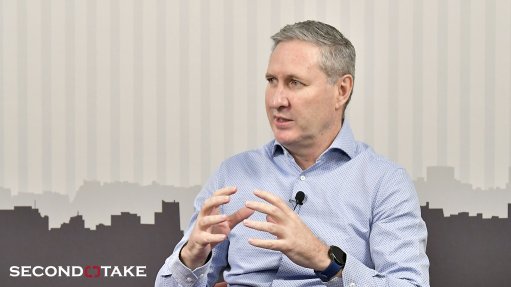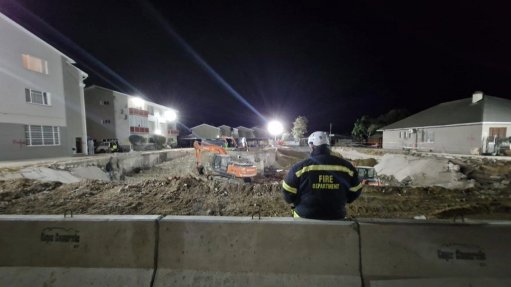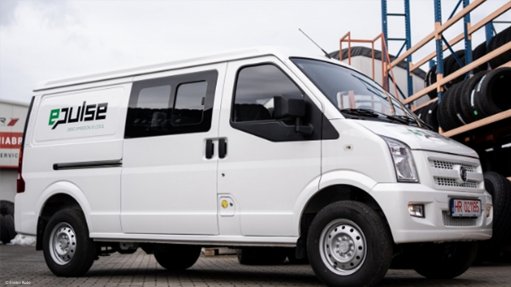Energy storage a key element of decarbonisation, the energy transition
The green energy transition is at the forefront of most business discussions and climate change mitigation strategies and energy storage will play a big role in not only adding value to renewable energy systems, but also in helping to advance decarbonisation and energy security.
“Energy storage will undoubtedly play a major role in the decarbonisation and green energy transition movements in the world as it strives to solve intermittency issues with renewable energy, such as solar and wind.
“No location in the world is immune from the energy transition,” said Green Hydrogen Solutions CEO and co-founder Ebrahim Takolia during a panel discussion at the Africa Energy Indaba on March 2.
Law firm Norton Rose Fulbright South Africa energy head Matthew Ash agreed that battery storage, from utility-scale applications through to distributed small-scale applications, had a vital role to play.
Moreover, he said, the sale of excess energy was enabled through batteries, which, in turn allowed for a more liberalised electricity market, with day-ahead mechanisms and free trade.
“Energy storage, particularly battery energy storage systems (BESSs), will open up possibilities for electricity market liberation in South Africa,” he noted.
The only hindrance remained the high cost to install BESSs, Ash highlighted, explaining that, despite lower prices as a result of technology improvements and increased rollouts by suppliers, there was now a competition for resources in the global market, owing to the electric vehicle market growing at such a rapid pace.
He advised that market drivers were pushing prices upwards all the time, and would therefore become more costly the longer governments, such as South Africa's, took to put in place procurement programmes and secure, or develop its own, resources.
Ash elaborated that early works agreements needed to be signed to preserve a production slot at a manufacturer for energy storage systems or components, not just for static storage systems but also mobile systems – such as lithium-ion batteries.
Only when more technologies for storage were adopted in the market, although it was hard to beat the efficiency of lithium-ion batteries, would demand not outstrip supply and prices come down, he stated.
Ash further said South Africa’s regulatory frameworks remained either too cumbersome or too unpredictable with regard to energy storage.
Bushveld Energy CEO Mikhail Nikomarov said there were three main drivers for energy storage growth – more economic activity globally, population growth and urbanisation.
These aspects impact on grid planning, where storage was needed and whether it made sense to build power lines to rural communities, when off-grid solutions could cater more efficiently, he noted.
Distributed energy solutions provider AMMP CEO and co-founder Svet Bajlekov agreed, saying that extending the grid to connect Africa’s 500-million “powerless” people was hardly the right solution, making energy storage inevitable for energy access and security.
With regard to the regulatory environment, Nikomarov remarked that technology always outpaced regulation. He believed it was nearly impossible to future-proof energy-related policies.
“Regulatory frameworks can either hinder innovation or advance it once it has emerged, but can hardly ever predict it.”
Nikomarov further explained that, to justify the cost of energy storage, a multiple-benefit use case was necessary, such as self-generation economics or energy security, complemented by environmental, social and governance mandates for cleaner operations.
Bajlekov noted that the emergence of energy storage had simultaneously given rise to interesting business models and solutions.
“The household space now provides clear business cases for renewable energy and distributed power generation. With solar, for example, a household can shift away from centralised power and have the opportunity to sell power back into the grid.
“Storage also brings up possibilities of banking power until prices peak throughout the day and make a business of selling electricity.”
Takolia added that California was looking to store energy in winter to cater for high-demand summer months when air conditioning was powered extensively. On the flip side, South Africa could store energy in summer for deployment in winter.
It will take some time before we see widespread trading of electricity in South Africa, but signs are showing the country is moving in this direction, such as the unbundling of Eskom into three separate entities.
Next, government would likely look at wheeling in day-ahead markets, which also posed interesting opportunities for battery companies to become arbitrage players in the market, Takolia highlighted.
“Managing renewable energy intermittency is complex, equally so is ensuring grid stability. We will certainly see smarter energy systems come to the fore, incorporating machine learning and artificial intelligence.
“We will see the likes of e-commerce giant Amazon moving into energy management and many distributed systems by companies, with devices linked up,” he said.
Takolia further noted that, because many African countries did not have legacy power systems, there was a massive opportunity to build newer systems without aged infrastructure as an obstacle, for which digitisation could be used to build modern systems.
The panellists all agreed that the world, and African countries in particular, had an opportunity to be creative in how it integrated systems for a better energy future, especially in places that were untouched by entrenched policy and old infrastructure.
Comments
Press Office
Announcements
What's On
Subscribe to improve your user experience...
Option 1 (equivalent of R125 a month):
Receive a weekly copy of Creamer Media's Engineering News & Mining Weekly magazine
(print copy for those in South Africa and e-magazine for those outside of South Africa)
Receive daily email newsletters
Access to full search results
Access archive of magazine back copies
Access to Projects in Progress
Access to ONE Research Report of your choice in PDF format
Option 2 (equivalent of R375 a month):
All benefits from Option 1
PLUS
Access to Creamer Media's Research Channel Africa for ALL Research Reports, in PDF format, on various industrial and mining sectors
including Electricity; Water; Energy Transition; Hydrogen; Roads, Rail and Ports; Coal; Gold; Platinum; Battery Metals; etc.
Already a subscriber?
Forgotten your password?
Receive weekly copy of Creamer Media's Engineering News & Mining Weekly magazine (print copy for those in South Africa and e-magazine for those outside of South Africa)
➕
Recieve daily email newsletters
➕
Access to full search results
➕
Access archive of magazine back copies
➕
Access to Projects in Progress
➕
Access to ONE Research Report of your choice in PDF format
RESEARCH CHANNEL AFRICA
R4500 (equivalent of R375 a month)
SUBSCRIBEAll benefits from Option 1
➕
Access to Creamer Media's Research Channel Africa for ALL Research Reports on various industrial and mining sectors, in PDF format, including on:
Electricity
➕
Water
➕
Energy Transition
➕
Hydrogen
➕
Roads, Rail and Ports
➕
Coal
➕
Gold
➕
Platinum
➕
Battery Metals
➕
etc.
Receive all benefits from Option 1 or Option 2 delivered to numerous people at your company
➕
Multiple User names and Passwords for simultaneous log-ins
➕
Intranet integration access to all in your organisation





















